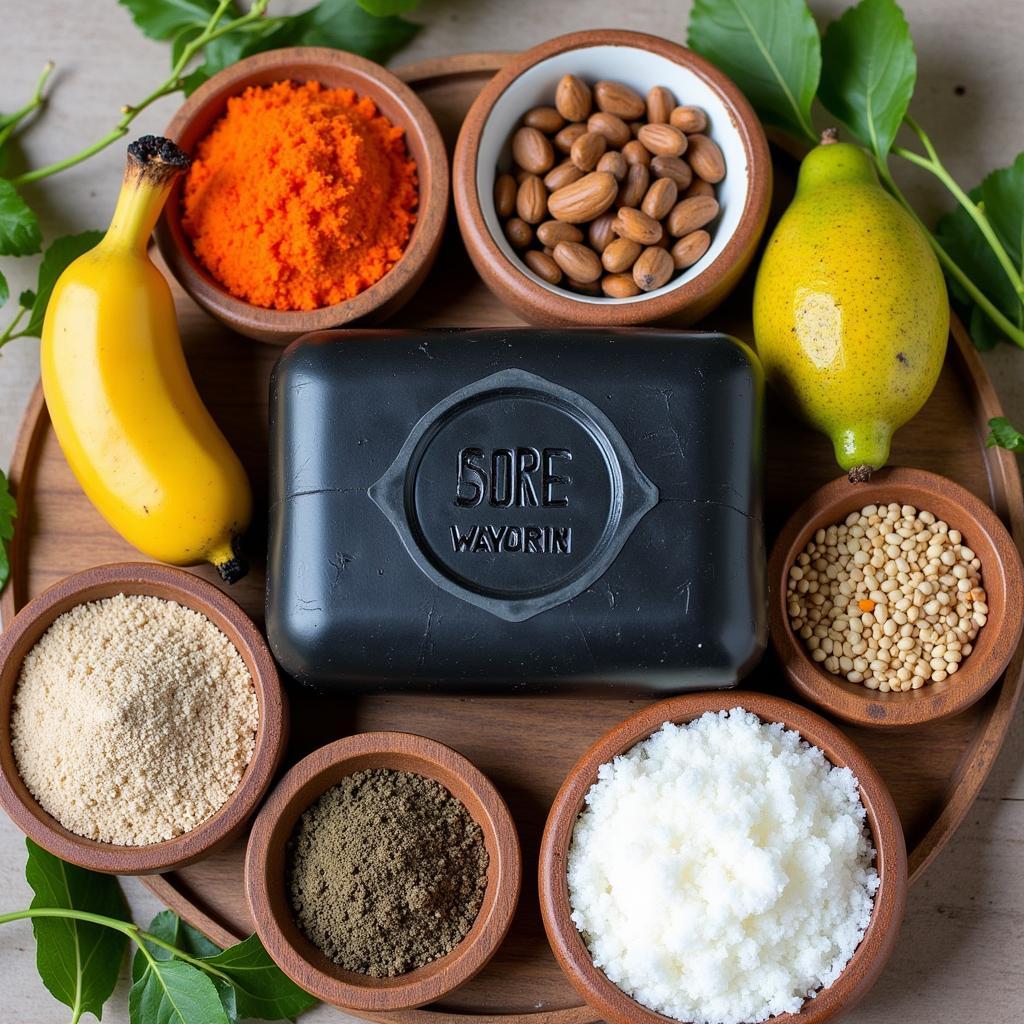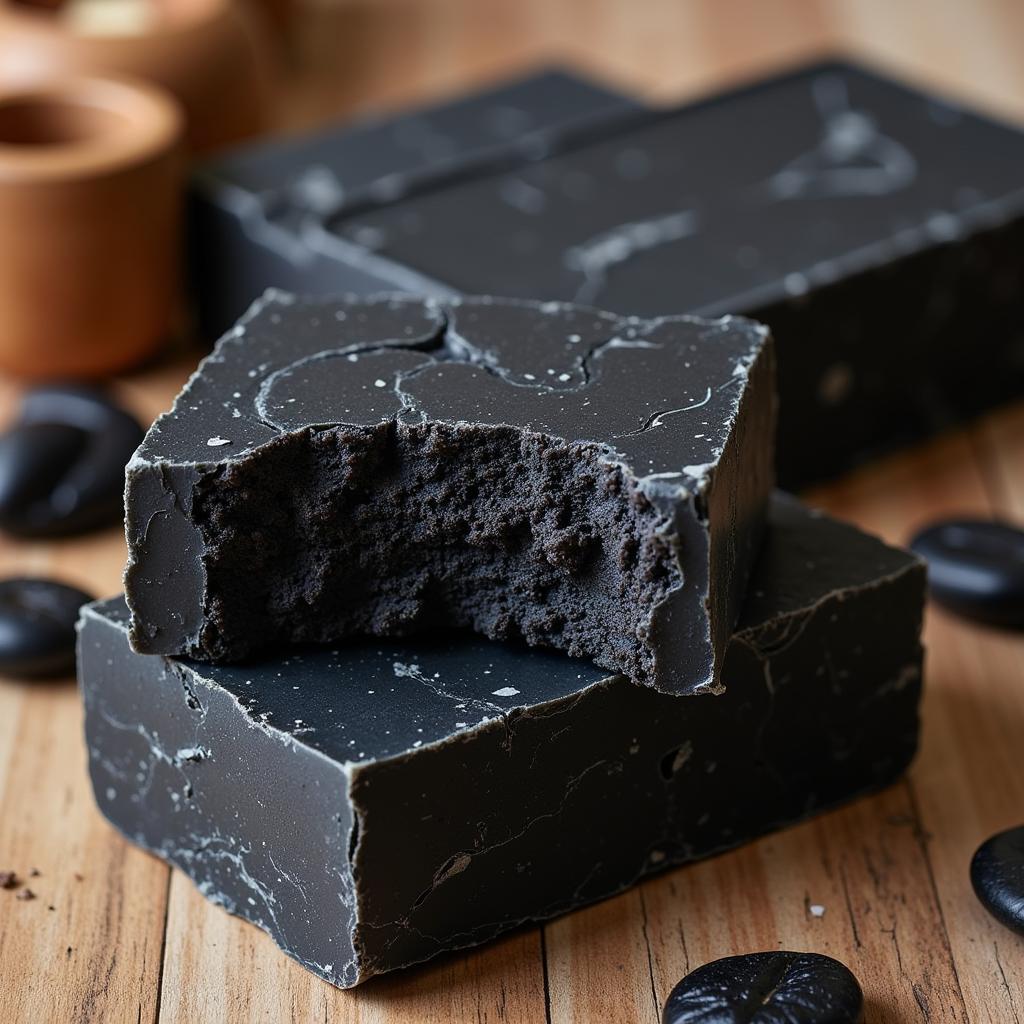African Black Soap for Skin Lightening: Separating Fact from Fiction
African black soap has taken the beauty world by storm, touted for its natural cleansing and skin-enhancing properties. Many people are particularly curious about its potential for skin lightening. This article delves into the truth about African black soap and its effects on skin tone, exploring its benefits, addressing common misconceptions, and providing essential information for informed skincare choices.
Unveiling the Magic of African Black Soap
 Traditional Ingredients of African Black Soap
Traditional Ingredients of African Black Soap
African black soap, also known as “black soap” or “Anago soap,” is a type of natural soap originating from West Africa, particularly Ghana. Unlike commercially produced soaps, it’s crafted using traditional methods passed down through generations. Its key ingredients typically include:
- Plantain Skins: Rich in vitamins A and E, antioxidants that help protect the skin from damage and promote cell turnover.
- Cocoa Pods: Known for their moisturizing properties, helping to soften and soothe the skin.
- Palm Kernel Oil: Offers deep hydration and can contribute to a healthy skin barrier.
- Shea Butter: A luxurious fat that intensely moisturizes and nourishes the skin, known for its healing and anti-inflammatory properties.
The exact recipe and ingredients can vary depending on the region and maker, adding to its unique character.
Can African Black Soap Lighten Skin?
The short answer is: not in the way some might expect. African black soap does not contain bleaching agents that drastically alter your natural skin tone. Instead, its benefits lie in promoting overall skin health, which can lead to a brighter, more even complexion.
Here’s how African black soap can positively impact your skin:
- Exfoliation: The soap’s natural texture gently removes dead skin cells, revealing brighter, smoother skin underneath.
- Reduced Hyperpigmentation: By promoting skin cell turnover, African black soap can help fade dark spots and hyperpigmentation over time, leading to a more even skin tone.
- Acne Control: Its antibacterial and anti-inflammatory properties can help manage acne breakouts and reduce the appearance of acne scars.
- Improved Skin Texture: Regular use can leave your skin feeling softer, smoother, and more supple.
While African black soap can contribute to a brighter and more radiant complexion, it’s essential to remember that it doesn’t bleach the skin.
Addressing Misconceptions and Managing Expectations
 Debunking Common Myths Surrounding African Black Soap
Debunking Common Myths Surrounding African Black Soap
There are several misconceptions surrounding African black soap and skin lightening:
-
Myth: African black soap can dramatically lighten skin tone.
-
Fact: African black soap promotes even skin tone by exfoliating and addressing hyperpigmentation, not by bleaching.
-
Myth: All African black soaps are created equal.
-
Fact: The quality and ingredients of African black soap can vary greatly. Opt for authentic, handcrafted soaps from reputable sources to reap its true benefits.
-
Myth: Results are immediate.
-
Fact: Like any skincare routine, consistency is key. It may take several weeks of regular use to notice visible improvements in skin tone and texture.
Choosing and Using African Black Soap Wisely
 Identifying and Selecting Authentic African Black Soap
Identifying and Selecting Authentic African Black Soap
When incorporating African black soap into your skincare routine, keep these tips in mind:
- Source: Purchase from reputable sellers specializing in authentic African products.
- Ingredients: Check for natural ingredients like plantain, cocoa pods, shea butter, and palm oil. Avoid soaps with artificial fragrances, colors, or harsh chemicals.
- Sensitivity: African black soap can be drying for some skin types. It’s crucial to start with a patch test and use it 2-3 times a week, gradually increasing frequency as tolerated.
- Moisturize: Always follow up with a good moisturizer to keep your skin hydrated.
- Sun Protection: Sun exposure can worsen hyperpigmentation. Always use sunscreen with an SPF of 30 or higher, especially after using exfoliating products like African black soap.
Conclusion
African black soap offers a myriad of skin benefits, including promoting a brighter, more even complexion. However, it’s crucial to approach its use with realistic expectations. While it can contribute to a more radiant glow by addressing hyperpigmentation and promoting skin cell turnover, it’s not a skin bleaching agent. By understanding its true properties and using it wisely, you can incorporate this natural treasure into your skincare routine for healthier, happier skin.
Frequently Asked Questions about African Black Soap and Skin Lightening:
- Can I use African black soap on my face?
Yes, but start slowly and monitor for any dryness or irritation. - How long does it take to see results?
It can take several weeks of consistent use to notice visible changes in skin tone and texture. - Is African black soap suitable for all skin types?
While generally safe, it’s essential to do a patch test, especially if you have sensitive skin. - Can I use African black soap alongside other skincare products?
Yes, but avoid harsh chemicals or treatments that might irritate the skin. - Where can I find authentic African black soap?
Purchase from reputable sellers specializing in authentic African products.
For more information on incorporating African beauty secrets into your routine, explore these articles:
Need personalized skincare advice? Contact us at +255768904061, kaka.mag@gmail.com or visit us in Mbarali DC Mawindi, Kangaga, Tanzania. Our dedicated customer care team is available 24/7 to assist you.

